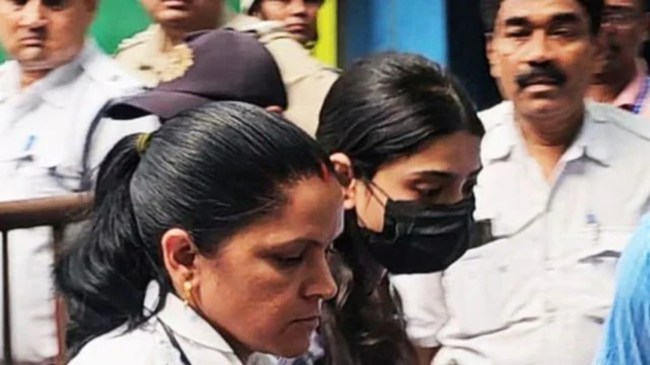Opinion The real question is not whether we agree with what Sharmistha Panoli said
It is whether we are willing to live in a country where the price of speaking is a prison cell
 It bears repeating that disagreement, offence, or even remarks made in bad taste are not grounds for arrest.
It bears repeating that disagreement, offence, or even remarks made in bad taste are not grounds for arrest. Before this week, I had never heard of Sharmistha Panoli. A law student from Pune, she was unknown to the wider public until her recent arrest by the Kolkata Police over an Instagram story about Operation Sindoor. But in the span of a few days, she has become the latest symbol of how speech, particularly on sensitive religious or political themes, is being policed with alarming ease in India. Her case adds to a growing list of individuals across professions and ideologies who have been targeted not for inciting violence or causing harm, but for expressing opinions that upset entrenched sensitivities.
This is not an isolated occurrence. It is part of an expanding trend where comedians, students, content creators, and ordinary citizens find themselves entangled in criminal proceedings for speech that would, in any healthy democracy, be dismissed as opinion, satire, or dissent.
Looking back at the 2021 arrest of comedian Munawar Faruqui in Indore, the pattern is unmistakable. Faruqui was taken into custody based on allegations that he might have hurt religious sentiments without any conclusive evidence that he had actually said anything objectionable at all. Despite the absence of clear proof, he spent over a month in jail. This was not the enforcement of law; it was the use of the law to intimidate and punish.
Ranveer Allahbadia, widely known as BeerBiceps recently found himself facing FIRs across multiple jurisdictions for a spontaneous remark made in a show. His tone may have been satirical, even immature, but it was hardly criminal. Yet, across social media and police complaints, outrage translated into legal action. What was once comic exaggeration is now treated as derogatory or controversial speech.
Even comics like Kunal Kamra have faced legal scrutiny for expressing critical views about the judiciary and a Maharashtra-based political party. Although contempt proceedings did not ultimately succeed, the fact that they were initiated at all shows the shrinking space for public engagement with institutions. The message is chilling: Humour, critique, and unorthodox views now come with the threat of real consequences.
The arrest of Sharmistha Panoli must be examined within this context. It is essential to locate these incidents within the framework of India’s penal provisions. Sections such as 153A of the Indian Penal Code (now Section 196 of the Bharatiya Nyaya Sanhita, 2023) and 295A IPC (now Section 299 BNS) were crafted with specific thresholds: The promotion of enmity between groups, or deliberate acts intended to outrage religious feelings, respectively. These are not intended to criminalise criticism or satire but to prevent acts that pose a clear and present danger to public order. Both provisions require proof of deliberate and malicious intent, a high bar that ensures the state does not casually suppress expression.
The Constitution, under Article 19(1)(a), guarantees freedom of speech and expression. And while Article 19(2) allows for reasonable restrictions, those restrictions are meant to be carefully and narrowly applied. In Shreya Singhal vs Union of India (2015), the Supreme Court clarified that only speech which incites imminent lawless action can be criminalised. Anything short of that is constitutionally protected. Yet, that benchmark is routinely ignored by enforcement agencies.
The danger is not only legal but cultural. A climate of hypersensitivity is being allowed, sometimes even encouraged, to override the fundamental right to free expression. It is no longer necessary to incite violence to get arrested. One only needs to say something provocative, or unpopular, or irreverent, especially on matters of faith. Speech is judged not by its legality, but by its potential to cause outrage.
This creeping culture of intolerance weakens our constitutional democracy. It corrodes the idea of public reason that democratic systems depend upon. It also flips the burden: Instead of the state having to justify a restriction on speech, the citizen must now justify why their expression should not be criminalised.
It bears repeating that disagreement, offence, or even remarks made in bad taste are not grounds for arrest. In a plural and diverse society like India, different viewpoints, even uncomfortable or controversial ones, must be accommodated unless they present a real and immediate threat to public order. This is the bedrock of constitutionalism.
The consequences of arrest are far-reaching. Even when bail is eventually granted or charges are dropped, the process itself becomes punishment. It damages reputations, chills further expression, and reinforces the idea that it is safer to remain silent than speak one’s mind. This is especially dangerous when applied to students and young professionals. The arrest or harassment of a law student like Sharmistha Panoli, or the above-mentioned comedians, indicates a clear pattern which cuts across ideology, gender, and geography. This does not reflect a society that values public debate. It reflects one that fears it.
In the end, the real question is not whether we agree with what Sharmistha Panoli said. The question is whether we are willing to live in a country where the price of speaking is a prison cell. If that becomes the norm, then it is not just free speech that suffers, it is our collective claim to be a constitutional democracy.
The writer is a legal researcher specialising in constitutional law, based in Delhi




